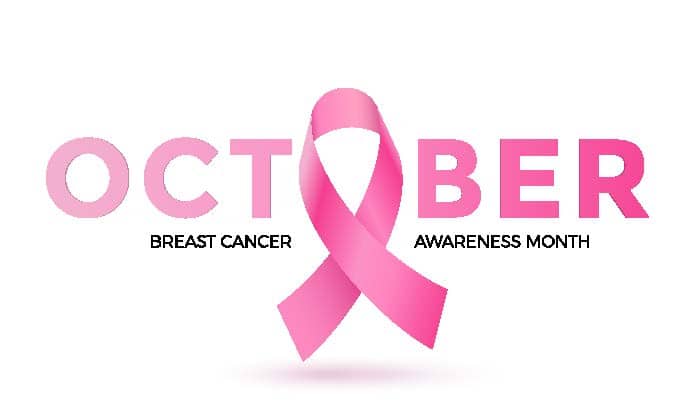
As a survivor, Krushenka Miller, owner of Skin+, is proud to participate in National Breast Cancer Awareness Month and will be donating 5% of all October sales to the Breast Cancer Awareness Society.
October is National Breast Cancer Awareness Month. It seems every year breast cancer becomes more prevalent right in our own homes. Whether it’s a friend or a family member, we see the devastating effects of breast cancer far too often. Although the screening processes and treatment options are better now than ever before, breast cancer still steals too many loved ones. Breast cancer doesn’t discriminate against race, income, age, or any other factors. Because of this, it’s more important than ever to be vigilant against the awful disease we know as breast cancer.
Breast cancer is the most common kind of cancer in women after skin cancer. About 1 in 8 women born today in the United States will get breast cancer at some point. The good news is that most women can survive breast cancer if it’s found and treated early. A mammogram is an x-ray picture of the breast to check for breast cancer. Mammograms can help find breast cancer early.
If you are a woman age 40 to 49, talk with your doctor about when to start getting mammograms and how often to get them.
If you are a woman age 50 to 74, be sure to get a mammogram every 2 years. You may also choose to get them more often.
The most common and effective way to combat breast cancer is through early detection. Early detection can help save lives and consistently does each year. According to a study done by the American Cancer Society, mammography reduces the risk of dying from breast cancer by about 20% in America and up to 40% in Europe and Canada.
Here are some signs/symptoms to be on the lookout for:
- A change in how the breast or nipple feels
- Nipple tenderness or a lump or thickening in or near the breast or underarm area
- A change in the skin texture or an enlargement of pores in the skin of the breast (some describe this as similar to an orange peel’s texture)
- A lump in the breast (It’s important to remember that all lumps should be investigated by a healthcare professional, but not all lumps are cancerous)
- A change in how the breast or nipple looks
- Any unexplained change in the size or shape of the breast
- Dimpling anywhere on the breast
- Unexplained swelling of the breast (especially if on one side only)
- Unexplained shrinkage of the breast (especially if on one side only)
- Recent asymmetry of the breasts (Although it is common for women to have one breast that is slightly larger than the other, if the onset of asymmetry is recent, it should be checked)
- Nipple that is turned slightly inward or inverted
- Skin of the breast, areola, or nipple that becomes scaly, red, or swollen or may have ridges or pitting resembling the skin of an orange
- Any discharge from the nipple, specifically clear or blood discharge
- It is also important to note that a milky discharge that is present when a woman is not breastfeeding should be checked by her doctor, although it is not likely linked with breast cancer
(National Breast Cancer Association)
Death rates from breast cancer have been steadily decreasing since the ’90’s. Experts think this in part due to increased awareness, early detection, better treatment options, and better screening processes. It’s imperative you get mammograms and give yourself monthly checks, early detection can and does save lives.
There are more than 2.8 million breast cancer survivors in the United States. If we join together and become proactive in the fight against breast cancer, we can make sure that no one faces this alone. With the correct screening, we can help fight this fight with our sisters, mothers, grandmothers, aunts, and anyone else who been impacted by breast cancer. While we can’t cure cancer, we can make sure that no one goes through this process alone.




